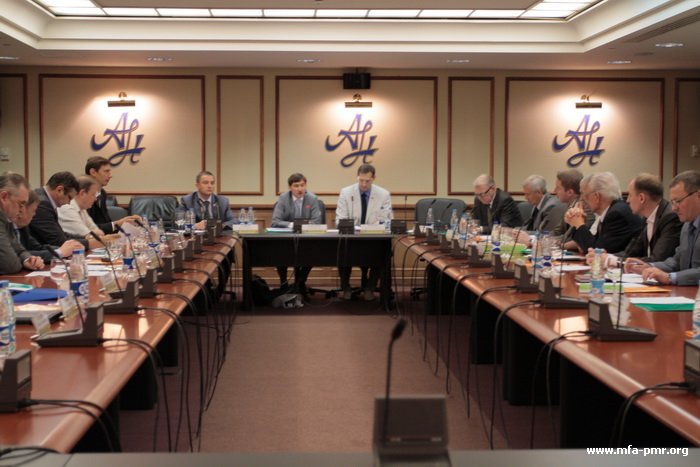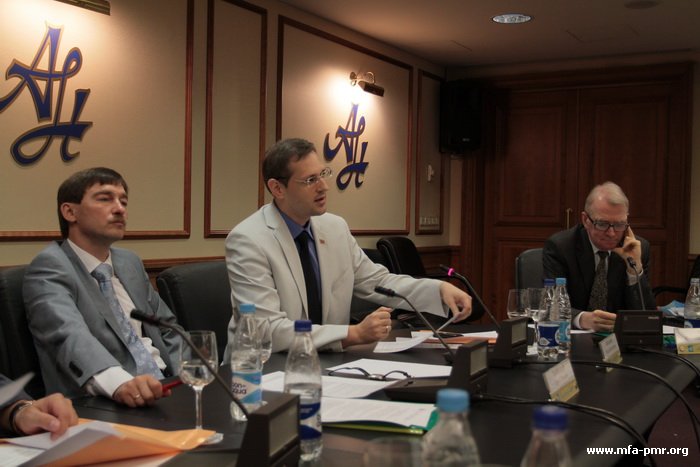International expert round table “20 Years of Russian Peacekeeping Mission on the Dniester and Topical Aspects of Pridnestrovian Settlement” organized by Institute of Russian Diaspora took place in Moscow on July 19. Leading experts on Moldova-Pridnestrovie settlement from Russia, Pridnestrovie, Moldova and Ukraine took part in the event devoted to signing of Agreement on the Principles of a Peaceful Settlement of the Armed Conflict in Pridnestrovie of July 21, 1992. Ministry of Foreign Affairs of the PMR was presented by Deputy Minister Vitaly Ignatiev and Head of Public Communications Department Igor Shornikov.
During the event experts discussed the 20-year-long term of Russian peacekeeping operation on Dniester, the role of peacekeeping forces in preserving security and stability in the region. Experts analyzed experience of Russian and Western initiatives to resolve the conflict, its geopolitical aspect and perspectives of Moldova-Pridnestrovie settlement in connection with Eurasian integration processes.
In his report representative of the Russian MFA Nikolai Fomin gave analysis of Moldova's and of Western participants' of the settlement process position towards the peacekeeping operation on Dniester. In conjunction with recent statements of the OSCE representatives he noted that Western partners lack clear understanding of any other mandate, alternative to the existing format of peacekeeping operation. Touching upon Moldova's position, Russian diplomat noted that political elite of this country failed to overstep the “shadow of the Law of 2005” on the “left-bank regions of Dniester” and that it seriously limits possibilities of political settlement.
Vitaly Ignatiev told about bases of effectiveness and about topical issues of work of current peacekeeping format. Pridnestrovian diplomat also noted unprecedented functionality and sustainability of the operation. He pointed out that in spite of lasting breaks in work of political negotiation format between Moldova and Pridnestrovie, the work of another international platform – of the trilateral peacekeeping operation and all its components did not break for 20 years actually. According to Vitaly Ignatiev, coordinated activity of the Joint Control Commission, based on the principles of consensus, allows to control situation in Security Zone even in cases of sporadic tensions. Mentioning the difference between rhetoric and actions of the Moldovan authorities which can be estimated as systematic attempts to disbalance the bases of peacekeeping mechanism, Pridnestrovian diplomat noted that at the same time Moldova is not ready to leave the Agreement of July 21, 1992. To Vitaly Ignatiev's point of view, official Kishinev clearly understands geopolitical role and general stabilizing role of peacekeeping mission under the aegis of the Russian Federation which contributes to preservation of atmosphere of peace and security.
Senior Fellow of the Russian Institute for Strategic Studies Vasily Kashirin stressed out in his report the fact that current peacekeeping operation on the territory of Greater Russia can be fully considered as a historically and geopolitically important event. It is based upon traditions of peacekeeping which appeared in XVIII-XIX centuries during Russia's liberation politics on the Balkans.
During the discussion experts highlighted the role of Romania in formation of political discourse in Moldova. According to Moldova's experts' well-founded opinion, the majority of politicians and experts in the country are subsidized from Bucharest and are expressing opinions which promote suppression of Moldavian identity and progressive merger of the republic by Romania. At the same time it was noted that the majority of Moldova's population sympathizes and is attracted towards Russia and, therefore, more active Russian policy in this region can get real support by the people. According to Sergei Nazaria, only 4% of Moldova's citizens support current course on integration to Romania and additional 8% can agree with “Unirea” idea due to their self-interests. Other people stand strongly against such merger.
In their turn, Pridnestrovian experts pointed out that Moldovan diplomacy attempts to present Moldova-Pridnestrovie settlement as a topic leading to Moldova's reintegration. According to Ilya Galinsky, Moldova's attempts to “put off-guard” Pridnestrovian and Russian negotiators have destructive nature and do not promote confidence-building between the sides.
Deputy Director of Center of Ukrainian and Belarusian Studies of the M.V. Lomonosov Moscow State University Bogdan Bespalko called attention of the experts to the fact of 20-years-long build-up of its own statehood and formation of its own identity by Pridnestrovie. He called to support measures carried out by the PMR in order to create conditions for international-legal recognition of the de-facto existing realities.
Issue of working out ways and possibilities of Russia's adoption and implementation of “soft force” mechanisms towards situation in Moldova and Pridnestrovie became one of the central topics in the work of the round table. According to some experts, Russia should more actively use existing instruments and new possibilities in information and humanitarian spheres in order to improve and strengthen her international image. In this context issue of Eurasian integration of Pridnestrovie was discussed. Igor Shornikov noted necessity of approaching movement from Russian side for Pridnestrovian Eurasian aspirations to succeed.
After the discussion Director of Institute of Russian Diaspora Sergei Panteleev noted constructive nature of the dialogue. He informed that the majority of ideas expressed during the seminar can be implemented in number of projects carried out by Institute of Russian Diaspora and other public organizations which seek to promote intensification of Russian policy in Moldova-Pridnestrovie region.
The majority of reports and opinions expressed during the seminar are to be published on Russian internet resources and in special edition published on the results of the International round table.









